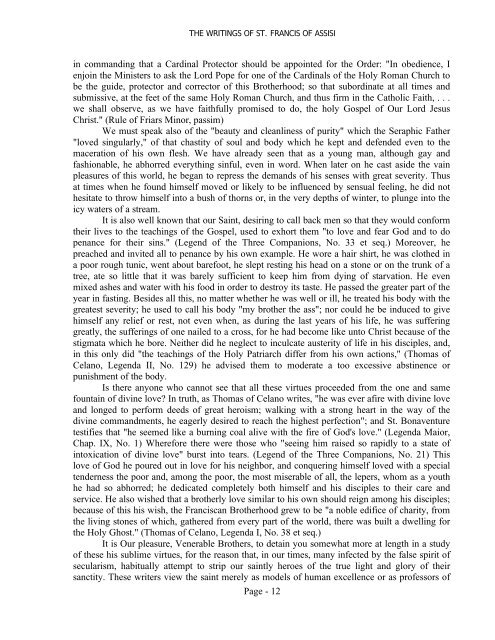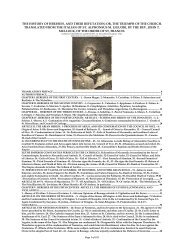The Writings of St. Francis of Assisi - + Saints' Works
The Writings of St. Francis of Assisi - + Saints' Works
The Writings of St. Francis of Assisi - + Saints' Works
Create successful ePaper yourself
Turn your PDF publications into a flip-book with our unique Google optimized e-Paper software.
THE WRITINGS OF ST. FRANCIS OF ASSISI<br />
in commanding that a Cardinal Protector should be appointed for the Order: "In obedience, I<br />
enjoin the Ministers to ask the Lord Pope for one <strong>of</strong> the Cardinals <strong>of</strong> the Holy Roman Church to<br />
be the guide, protector and corrector <strong>of</strong> this Brotherhood; so that subordinate at all times and<br />
submissive, at the feet <strong>of</strong> the same Holy Roman Church, and thus firm in the Catholic Faith, . . .<br />
we shall observe, as we have faithfully promised to do, the holy Gospel <strong>of</strong> Our Lord Jesus<br />
Christ." (Rule <strong>of</strong> Friars Minor, passim)<br />
We must speak also <strong>of</strong> the "beauty and cleanliness <strong>of</strong> purity" which the Seraphic Father<br />
"loved singularly," <strong>of</strong> that chastity <strong>of</strong> soul and body which he kept and defended even to the<br />
maceration <strong>of</strong> his own flesh. We have already seen that as a young man, although gay and<br />
fashionable, he abhorred everything sinful, even in word. When later on he cast aside the vain<br />
pleasures <strong>of</strong> this world, he began to repress the demands <strong>of</strong> his senses with great severity. Thus<br />
at times when he found himself moved or likely to be influenced by sensual feeling, he did not<br />
hesitate to throw himself into a bush <strong>of</strong> thorns or, in the very depths <strong>of</strong> winter, to plunge into the<br />
icy waters <strong>of</strong> a stream.<br />
It is also well known that our Saint, desiring to call back men so that they would conform<br />
their lives to the teachings <strong>of</strong> the Gospel, used to exhort them "to love and fear God and to do<br />
penance for their sins." (Legend <strong>of</strong> the Three Companions, No. 33 et seq.) Moreover, he<br />
preached and invited all to penance by his own example. He wore a hair shirt, he was clothed in<br />
a poor rough tunic, went about barefoot, he slept resting his head on a stone or on the trunk <strong>of</strong> a<br />
tree, ate so little that it was barely sufficient to keep him from dying <strong>of</strong> starvation. He even<br />
mixed ashes and water with his food in order to destroy its taste. He passed the greater part <strong>of</strong> the<br />
year in fasting. Besides all this, no matter whether he was well or ill, he treated his body with the<br />
greatest severity; he used to call his body "my brother the ass"; nor could he be induced to give<br />
himself any relief or rest, not even when, as during the last years <strong>of</strong> his life, he was suffering<br />
greatly, the sufferings <strong>of</strong> one nailed to a cross, for he had become like unto Christ because <strong>of</strong> the<br />
stigmata which he bore. Neither did he neglect to inculcate austerity <strong>of</strong> life in his disciples, and,<br />
in this only did "the teachings <strong>of</strong> the Holy Patriarch differ from his own actions," (Thomas <strong>of</strong><br />
Celano, Legenda II, No. 129) he advised them to moderate a too excessive abstinence or<br />
punishment <strong>of</strong> the body.<br />
Is there anyone who cannot see that all these virtues proceeded from the one and same<br />
fountain <strong>of</strong> divine love? In truth, as Thomas <strong>of</strong> Celano writes, "he was ever afire with divine love<br />
and longed to perform deeds <strong>of</strong> great heroism; walking with a strong heart in the way <strong>of</strong> the<br />
divine commandments, he eagerly desired to reach the highest perfection"; and <strong>St</strong>. Bonaventure<br />
testifies that "he seemed like a burning coal alive with the fire <strong>of</strong> God's love." (Legenda Maior,<br />
Chap. IX, No. 1) Wherefore there were those who "seeing him raised so rapidly to a state <strong>of</strong><br />
intoxication <strong>of</strong> divine love" burst into tears. (Legend <strong>of</strong> the Three Companions, No. 21) This<br />
love <strong>of</strong> God he poured out in love for his neighbor, and conquering himself loved with a special<br />
tenderness the poor and, among the poor, the most miserable <strong>of</strong> all, the lepers, whom as a youth<br />
he had so abhorred; he dedicated completely both himself and his disciples to their care and<br />
service. He also wished that a brotherly love similar to his own should reign among his disciples;<br />
because <strong>of</strong> this his wish, the <strong>Francis</strong>can Brotherhood grew to be "a noble edifice <strong>of</strong> charity, from<br />
the living stones <strong>of</strong> which, gathered from every part <strong>of</strong> the world, there was built a dwelling for<br />
the Holy Ghost." (Thomas <strong>of</strong> Celano, Legenda I, No. 38 et seq.)<br />
It is Our pleasure, Venerable Brothers, to detain you somewhat more at length in a study<br />
<strong>of</strong> these his sublime virtues, for the reason that, in our times, many infected by the false spirit <strong>of</strong><br />
secularism, habitually attempt to strip our saintly heroes <strong>of</strong> the true light and glory <strong>of</strong> their<br />
sanctity. <strong>The</strong>se writers view the saint merely as models <strong>of</strong> human excellence or as pr<strong>of</strong>essors <strong>of</strong><br />
Page - 12













